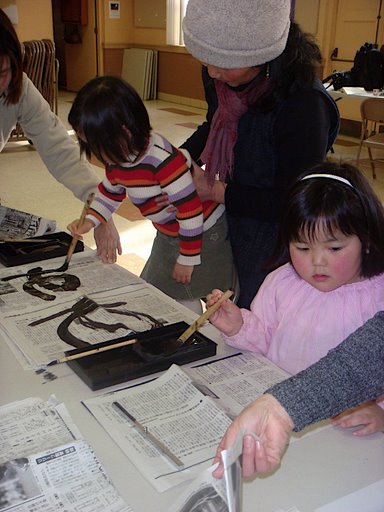
December 31/January 1 is my favorite holiday, probably because I associate a lot of good memories with this night.
No one goes to school on this day, but it would be fun to start off the first day back at school with some new year's cultural activities such as:
Bonfires made of old Christmas trees happen all over the Netherlands on New Year's Eve. Now that's an education law suit waiting to happen. Scratch this idea?
In Japan, some people observe "kakizome" on the second day of January (which may or may not be the first day back at school, now that I think of it). It's basically a calligraphy exercise: people write a phrase or poem using brushes & ink. It's very similar to the Chinese New Year tradition of writing lucky words on red paper - except that the Japanese tend to use white, or cream, colored paper.
The Russians eat meat and potato dishes. Care for kartoshnik, students?
The Danes like to save old dishes, probably chipped ones, throughout the year, then throw them at their friend's homes on the 31st. So you know you have a lot of friends when you find a huge pile of broken dishes on your front step in the morning. I can make it work with some modifications - perhaps taking broken dishes and cementing the pieces into a mosaic?
Carnivals ring in the South African new year. This can be a school-wide, or even community wide, event. Lots of coordination, lots of work, but probably really, really fun.
For a more scientific approach, like the Germans, I could melt metal and drop it in buckets of water to tell fortunes for the coming year. According to this, if the metal comes out in a shape of a pig, then your year will be full of plenty.
Photo from here.
Most of the ideas I got from this site deal with non-January 1 New Year's events. Actually, I suppose most of the world's traditional new year begins with the coming of spring and the end of winter.
Hm, perhaps an even more academically acceptable activity would be to study the different types of calendars. It'll be interesting for students to figure out where their birthdays fall on say, the Julian calendar, or the lunar calendar.
2 comments:
Really nice post Bonnie, I really enjoyed it. I learned a lot about New Year's traditions around the world. You're right, it would be great to incorporate some of those ideas in the classroom.
Yeah! If you ever end up doing one of these things, let me know how it goes.
Post a Comment